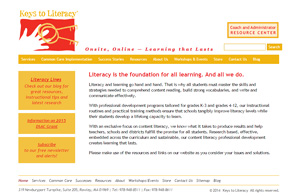 As 2015 quickly approaches, it is a perfect time to reflect and set some new goals. With that in mind, I would like to introduce you to some incredibly useful resources.
As 2015 quickly approaches, it is a perfect time to reflect and set some new goals. With that in mind, I would like to introduce you to some incredibly useful resources.
First is Joan Sedita’s important work with literacy and her comprehensive website, Keys to Literacy. This website is well respected in the professional community and was cofounded with Brad Neuenhaus in 2007. Sedita earned her MEd from Harvard and has taught in the field of literacy for more than 35 years. She is a nationally recognized as a teacher trainer and author and Keys to Literacy is packed with practical literacy pedagogy, best teaching practices, and professional opportunities for literacy instructors in every grade, as well as for students and instructors in higher education. You will find the information and ideas can inform your lesson planning for learners with a range of ability levels.
Keys to Literacy covers topics ranging from Common Core implementation to professional development. There are opportunities to subscribe to the Keys to Literacy Newsletter and the Literacy Lines blog and you can shop for books and posters in the online store. I challenge you to join me, along with thousands of other educators, and sign up for these FREE resources. Both are packed with the latest research from top experts in the field, best teaching practices, and resource links to help you improve your literacy instruction in ways that increase student learning.
One especially informative resource on Sedita’s website is the Fall 2014 Keys to Literacy Newsletter. With the fast-paced challenges we face in the field of digital literacy, it is reassuring to have credible information that offers timely research for educators. This newsletter focuses on the differences between new literacy and traditional literacy skills, as well as online reading comprehension skills. I love integrating technology to enhance, motivate, engage, empower, and improve student learning, but I often wonder about how to most effectively teach online research and reading comprehension skills. This issue of the Keys to Literacy Newsletter provides links to Donald Leu’s work in The New Literacies Research Lab at the University of Connecticut’s NEAG School of Education and a wide assortment of related resources. From here, you can read up on current literacy research and learn more about the federally funded Online Research and Comprehension Assessment (ORCA) project. The newsletter also links you to the New Literacies and 21st Century Technologies Position Statement published by the International Reading Association (IRA); Julie Coiro’s supporting article about the importance of online reading comprehension titled Rethinking Online Reading Assessment published in Educational Leadership; and her podcast interview titled “How Offline Reading, Online Reading, and Prior Knowledge Can Help Predict Student’s Abilities to Understand What They Read Online” broadcasted on Voice of Literacy. Voice of Literacy, founded in 2008 by Betsy Baker, offers bi-weekly podcasts of interviews with literacy experts who discuss their research on improving literacy instruction and implications of their work for teachers, principals, parents and policy makers.
As you can see, this post started with a focus on Sedita and her work with Keys to Literacy and quickly migrated into a mashup of experts and resources in the literacy field. Make it your New Year’s resolution to visit the website and sign-up for the Keys to Literacy Newsletter and the Literacy Lines blog so you don’t miss a beat (or a syllable)!
Mary Beth Scumaci is a Clinical Associate Professor with the Division of Education at Medaille College in Buffalo, New York. She can be reached at mscumaci@medaille.edu.
This post is part of a series from the International Reading Association’s Technology in Literacy Education Special Interest Group (TILE SIG).